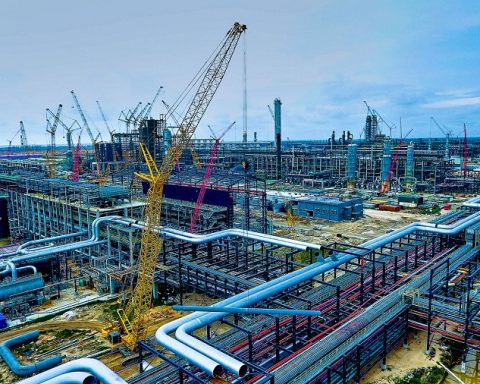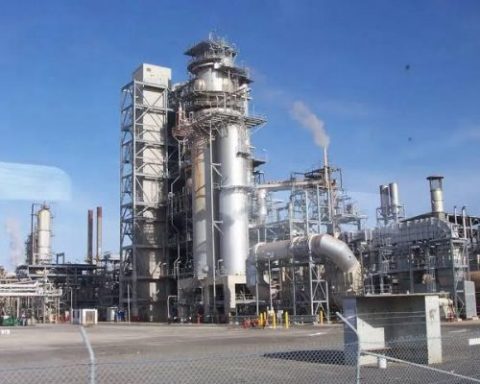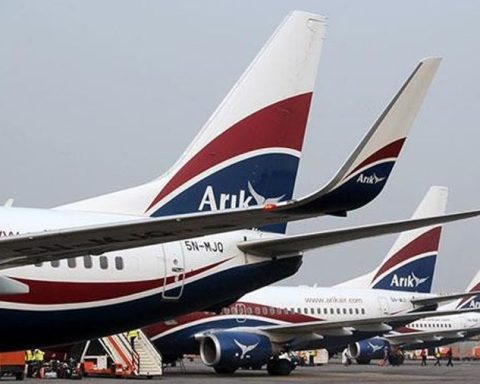The Dangote Petroleum Refinery’s plan to launch direct fuel distribution has sparked intense debate in Nigeria’s downstream petroleum sector, regarding efficiency and fears of market domination.
The $20 billion Dangote Refinery, with its 650,000 barrel-per-day capacity, had in June announced plans to begin direct supply of petroleum products to retailers across the country beginning from 15 August 2025. It indicated plans to deploy 4,000 CNG-powered tankers, an investment worth about N720 billion.
Join our WhatsApp ChannelWith the scheme, the company aims to offer free logistics support, absorbing transportation costs that typically account for about 10-30 per cent of fuel prices.
The scheme also provides credit facilities, allowing bulk buyers to obtain 500,000 liters on credit for two weeks with bank guarantees.
This means the refinery will bypass traditional intermediaries like depot owners and independent marketers by supplying directly to retailers and industrial users.
By controlling both production and distribution, Dangote argues it can significantly lower costs for consumers while improving supply reliability, particularly in rural areas.
However, some groups of marketers have kicked against Dangote’s move, claiming that it could lead to monopoly.
While marketers warn of potential disruptions and job losses, some experts argue that the solution lies in marketers investing in their own refineries rather than opposing Dangote’s initiative.
READ ALSO: Marketers Fret As Dangote Moves To Crash Cooking Gas Price
The Natural Oil and Gas Suppliers Association of Nigeria (NOGASA) and the Petroleum Products Retail Outlets Owners Association of Nigeria (PETROAN) argue that Dangote’s plan to bypass traditional distributors could destabilize the existing supply chain, leading to scarcity and job losses. They cited the failed attempt by NNPC to handle direct distribution as a cautionary example.
On its part, PETROAN likened the situation to Dangote’s dominance in the cement industry, where prices surged after what was perceived as market consolidation.
NOGASA lamented that the direct distribution model would lead to job losses, especially for truck drivers and depot workers.
Regulatory and Legal Concerns
Marketers have also argued that the refinery’s license covers production but not distribution, which falls under different PIA (Petroleum Industry Act) frameworks. They called on the Nigerian Midstream and Downstream Petroleum Regulatory Authority (NMDPRA) to: enforce clear market boundaries between refining and distribution, implement price control mechanisms to prevent predatory pricing, and ensure crude oil access for other local refiners to maintain competition.
‘Get Your Own Refinery’, Experts Tell Marketers
Energy analyst, Mr Ikechukwu Okafor, in an interview with Prime Business Africa, said the concerns raised by marketers about the monopoly are misplaced. Okafor said the claim that Dangote would monopolise petroleum distribution as he did in the Cement industry is unfounded. He said a comparative analysis of the price of Dangote Cement in Nigeria and other African countries shows that it is cheaper in Nigeria.
According to him, the refinery has the capacity to meet consumption demands in Nigeria and nobody should blame the company for monopoly when the state-owned refineries with a combined total capacity of 445,000bpd cannot produce anything at the moment.
“People might look at Dangote as being monopolistic. Who wouldn’t be?” he asked. “Look at the NNPC, all the refineries are down. It is quite painful.”
He recalled that there was a time the NNPC bought tankers for the distribution of petroleum products, but they all disappeared after a while.
He said the activities of truckers operating both in the petroleum industry and other sectors call for concern. According to him, they often charge exorbitant fees for the haulage of products.
“What they (truckers) are doing amounts to collusion. Anybody who is against the distribution plan should go and take a loan and match Dangote. Besides, they have so many rickety trucks plying the roads, causing damage. There is so much conspiracy among transporters.”
The retired petroleum engineer expressed optimism that more refineries would come on stream in the next four or five years to boost domestic refining capacity, giving room for more competition in the market.
Financial analyst, Kalu Aja, said under the current deregulated system in the downstream market, Dangote refinery, as a producer, has the right to determine how its products will be distributed.
“This is like saying that Coca-Cola doing direct sales to any major distributor will lead to disruptions. Dangote has scale; scale always wins. The swing producer will determine how his products will be distributed. If you disagree, get your refinery,” Aja stated.
Economist and energy expert, Mr Kelvin Emmanuel, countered the arguments by marketers about monopoly.
Mr Emmanuel, who is also co-founder of Dairy Hills, argued that marketers’ resistance stems from vested interests in maintaining the status quo, where arbitrage and middlemen inflate costs.
“People have valid concerns, but let’s be clear: the real business marketers have been involved in isn’t selling PMS with margins of N5 to N15,” he stated during an interview on a national TV. “Their real gains have come from exploiting arbitrage opportunities, often with substandard imports that don’t meet the sulphur specifications outlined in the Petroleum Industry Act (PIA).”
He pointed out that logistical and regulatory shortcomings have hampered fuel distribution.
“Dangote is taking on the burden of transportation, storage, and bridging costs that should have been streamlined long ago. This is in response to the resistance from vested interests who have tried to frustrate fair and efficient distribution,” he added.
READ ALSO: Dangote Refinery Receives 4,000 Brand-new CNG Trucks For Fuel Distribution Nationwide
The marketers’ pushback has also sparked reactions online, with many seeing Dangote’s direct distribution initiative as a transformative one for Africa’s largest economy.
“They should all come together and build their own refinery and rival Dangote’s refinery, with this more job will be created and they should stop crying after all they’ve benefited from Nigerians delivering poor fuel at high cost, they should go to HELL if they can’t set up refinery,” an X user, Bliz Ohio stated.
“The market should be competitive. If Dangote is offering better supply chain efficiency and pricing, others should innovate, not complain. Protectionism won’t help Nigeria grow,” Nas Abdul stated on X.
“Dangote Refinery’s plan to distribute petroleum products directly to the retailer is a good move. It will bring more competition, make fuel easier to get, and may even help lower prices. In the end, it’s good for the people and the country,” another X user, Godwin Abiola, stated.
“Our oil sector is now experiencing true deregulation. You can’t slap a child and still ask the child not to cry. That’s cruel. Dangote will do whatever is necessary to sell his goods. The market is big. They can also come together to start their own refinery, too, if they so wish,” Dr Olufemi Amoo.
“All these people care only for their profits, not for our well-being. We Nigerians support Dangote for this new move to distribute petroleum across the country,” Auwal Uthman.
“The debacle of addiction lies in the difficulty of transitioning. People have become used to this Trojan fuel racket. The simple reality is that there is a global energy transition. Owning a CNG refueling station offers a clear guarantee of over 105% ROI. Diversify, don’t fight Dangote,” Peter Okwor, a CNG Vehicle conversion expert, stated.
The Dangote refinery’s distribution initiative represents both an unprecedented opportunity to reform Nigeria’s inefficient fuel sector and a potential threat to market competition. The coming months will test whether regulators can foster private sector efficiency while preventing monopolistic excesses—a balance critical for Nigeria’s energy security and economic development.
Temitope Lawal, Director, Warehousing at Alerzo urges that “Nigeria must celebrate private efficiency without surrendering public interest…before we move from fuel scarcity to fuel feudalism.”












